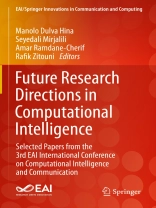This book presents select papers from 3rd EAI International Conference on Computational Intelligence and Communications (CICom 2022). The papers reveal recent advances in the broader domains of Computational Intelligence including (1) automation, control, and intelligent transportation system, (2) big data, internet of things, and smart cities, (3) wireless communication systems and cyber security and (4) human/brain-computer interfaces, and image and pattern recognition. The book demonstrates complex real-world problems in which mathematical or traditional modellings are not the preferred solution, hence alternative solutions are needed. This collection of applications demonstrates the important advances in computational intelligence. The book chapters’ present various ideas that will benefit researchers, graduate students and engineers in this domain.
Inhoudsopgave
Introduction.- Perception Enhancement of a Vehicle in a Bad Weather Environment.- Adaptive Backstepping-RBF Control of Lower Limb Exoskeleton.- Advances in Coyote Optimization Algorithm.- Efficient Big Data Architecture Based on Micro Service.- K Semantics for Security Policy Enforcement on Android Applications with Practical Cases.- On the Performance of MIMO Vehicular Visible Light Communications.- An Evaluation Framework for Blockchain-based Public Key Infrastructures.- Intelligent Target Cell Selection Algorithm for Low Latency 5G Networks.- Conclusion.
Over de auteur
Manolo Dulva Hina is currently an Associate Professor at ECE Research Center at ECE Engineering School (ECE Ecole d’Ingénieurs) in Paris, France. He obtained his Ph.D. in Computer Science from the University of Versailles – Paris Saclay in Versailles, France in 2011, and his Ph.D. in Engineering (Applied Research) from Université du Québec, Ecole de technologie supérieure in Montréal, QC, Canada in 2010. He has more than twenty years of teaching experience in Computer Science, and Engineering, having taught in various colleges and universities in the Philippines, Canada, Bahrain, and France. He also served as Dean of the College of Computer Studies in University of Technology Bahrain (formerly AMA International University Bahrain). He has edited several books and published several book chapters in computational intelligence. He has also published several papers in top tier journals, and in international conferences, in which six of his papers won “Best Paper” awards. He was also invited as Keynote Speaker in several international conferences. He serves as Chair of the annual EAI/Springer International Conference on Computational Intelligence and Communication (CICom). His research interests are in the area of computational intelligence, intelligent transportation system, ambient intelligence, human-machine interactions, and formal specifications.
Seyedali Mirjalili is a Professor at Torrens University Center for Artificial Intelligence Research and Optimization and is internationally recognized for his advances in nature-inspired Artificial Intelligence (AI) techniques. He is the author of more than 300 publications including five books, 250 journal articles, 20 conference papers, and 30 book chapters. With over 50, 000 citations and H-index of 75, he is one of the most influential AI researchers in the world. From Google Scholar metrics, he is globally the most cited researcher in Optimization using AI techniques, which is his main area ofexpertise. Since 2019, he has been in the list of 1% highly-cited researchers and named as one of the most influential researchers in the world by Web of Science. In 2021, The Australian newspaper named him the top researcher in Australia in three fields of Artificial Intelligence, Evolutionary Computation, and Fuzzy Systems. He is a senior member of IEEE and is serving as an editor of leading AI journals including Neurocomputing, Applied Soft Computing, Advances in Engineering Software, Computers in Biology and Medicine, Decision analytics, Healthcare Analytics, Applied Intelligence, and Plos ONE.
Amar Ramdane-Cherif received his Ph.D. degree from Pierre and Marie Curie University in Paris in 1998. In 2007, he obtained his HDR degree from Versailles University. From 2000 to 2007 he was associate professor at university of Versailles and worked in PRISM Laboratory. Since 2008, he is Full Professor at University of Versailles which belong to the Paris Saclay university and he works in LISV laboratory. His research interests include ambient intelligence, semantic representation of knowledge, modelling of the ambient environment, multimodal interaction between person-machine and machine-environment, system of fusion and fission of events, ambient assistance, software architecture, software quality, quality evaluation methods, functional and non-functional measurement of real-time, reactive and software embedded systems. He wrote 7 book chapters, 50 international journals and about 200 international conferences. He supervised 20 doctoral Ph D thesis and reviewed 30 Ph D theses. He managed several projects and made several national and intentional collaboration. Actually, he is member in the council board of the graduate school of computer science of the university of Paris Saclay.
Rafik Zitouni is a Senior Research Fellow at the University of Surrey and Leader Research Developer at the 5G and 6G Innovation Centers. He is a highly accomplished research engineer and academic with a wealth of experience in computer science. His expertise in new architecture and protocols for 5G New Radio & 6G networks has led to significant contributions to numerous international projects. Previously, he was a lecturer at the ECE Paris Graduate School of Engineering in France and a research associate at the VEDECOM Institute in Versailles, France. He holds a Ph.D. in computer science from the University of Paris-Est and an M.Sc. from the University of Paris 12. He also obtained Engineer and Magister degrees in Artificial Intelligence and Computer Networks from the universities of Setif and Bejaia in Algeria. Dr. Zitouni’s research interests include wireless network protocols, software and cognitive radios with artificial intelligence, and software design. He has published numerous research articles in top-tier academic journals, and his expertise has led to invitations to speak at conferences around the world. In addition to his technical researchsubjects, he has taken a leadership role in organizing research conferences in Africa and Europe. Dr. Zitouni has also co-edited several books on new technologies for emerging countries and on computational intelligence.












